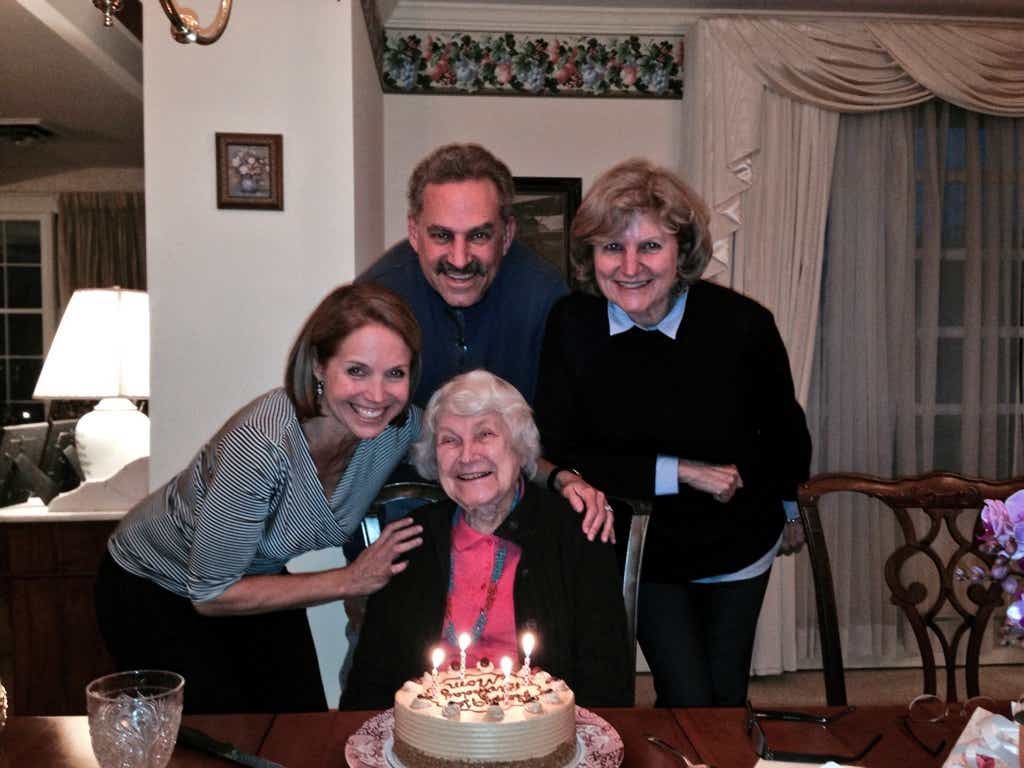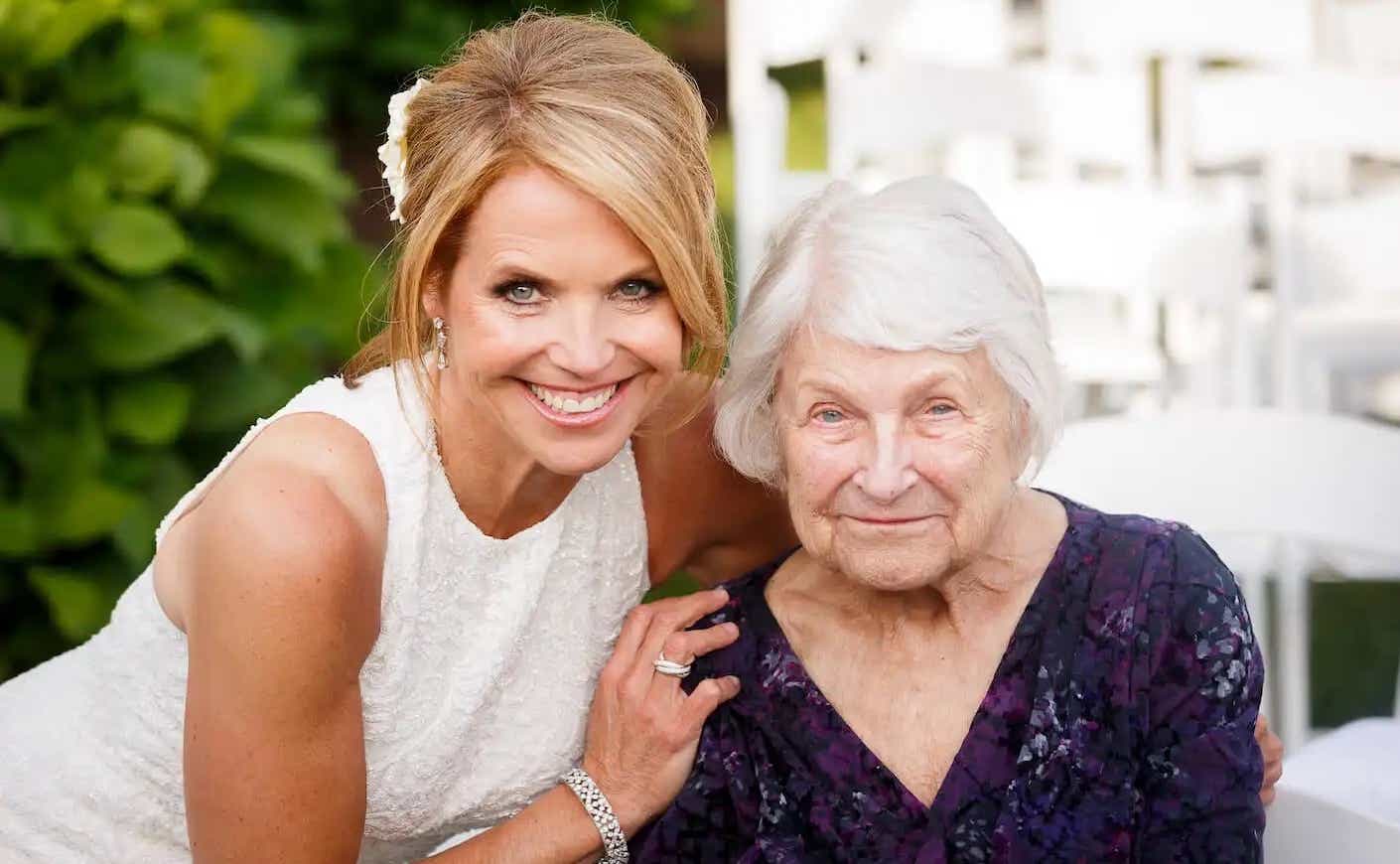My mom died 10 years ago this Labor Day. I was driving in my friend Charlie’s car and said to her, “I have a pain in my heart. I can’t breathe.” Moments later my brother Johnny called to say my mom was gone. It was 1:18 p.m. I loved my mom to the ends of the earth. I was one of those kids who adored her parents and always felt completely and unconditionally loved my entire life. Losing my dad in 2011 utterly crushed me, as did losing my mom three years later. Here’s what I wrote about my mom in my memoir, Going There.
Our mother was the ultimate protector and defender — a homemaker in the most concrete sense, always doing for us, pulling for us, waiting for us to come home. She’d tell me, “Everyone needs a cheerleader. I’m yours.” She was sturdy in every way. When I was little, I’d spring up and wrap my legs and arms around her and hold on like a koala bear in a eucalyptus tree.
After two years at Sophie Newcomb College in New Orleans, my mom moved to Chicago and lived at the Three Arts Club while working as a cartographer at Rand McNally and doing layout for Coronet magazine. All of which seemed pretty exciting to me. My dad was nearby at officer candidate school; they met at a tea dance in 1943. My mom thought he was dashing in his navy whites; he thought she was “a dish” in her red paisley dress. While she waited in Chicago, he did a tour of duty on a naval destroyer in the Pacific, once operating a smoke machine to hide his ship from kamikaze pilots. Less than a year later, they were married, and his life became hers.
The mothers I knew growing up didn’t have careers, with the exception of Christine Hughes’s mom. (Dr. Hughes helped us with our sixth-grade science-fair project, which entailed pumping cigarette smoke into a fishbowl to show how nicotine would cause a goldfish to lose its equilibrium, sending ours into an aquatic barrel roll.) My mom’s job was us — fixing our breakfasts, packing our lunches (sometimes including little notes like Don’t get stuck in your peanut butter sandwich!), driving whatever I’d forgotten (my purse, my sweater, my homework, my permission slip) to school, bringing me to piano lessons and Johnny to guitar. My mother was the family concierge, making sure we all had what we needed.
She’d always say, “Let ’em know you’re there.” The woman who ran our household like a boss, but had neither the opportunity nor the self-confidence to let the world know she was there, wanted more for us.
My mom was born in 1923, just three years after women won the right to vote, decades before we’d enter the workforce in real numbers.
Sometimes I wonder: What if little Elinor Hene had been told the sky was the limit? If she’d come along a generation later, what might she have been — a graphic artist? She loved to sketch and paint. A stockbroker? When the AIDS crisis hit, she bought shares of Trojan condoms. Head of operations at some big company? She certainly ran a tight ship. Who knows — maybe she wouldn’t have changed a thing.”
I feel so blessed that my mom was able to attend my wedding to John in EastHampton. My brother Johnny had accidentally left her suitcase (and her medications) in his now locked car at the airport so I spent much of my wedding day figuring out how to logistically break into the car and get her things safely delivered to my home. (Johnny is lucky he is still alive.) After the wedding, she was in the kitchen with Kathleen, one of my oldest friends, and confided that she was so relieved I had finally found someone. After all, it had been 16 years since Jay had died. I hope that gave her some solace. Her health started to decline when we were on our honeymoon in Italy. As I wrote in my book,
“When we arrived in Florence, I got word that my mom was running a fever, and the home health aide she’d finally allowed in the house had called 911. Johnny rushed over and found her gripping the banister, screaming, “No, no, no,” refusing to go. The paramedics had to carry her downstairs. I have thought about that disturbing scene so many times, it’s almost as if I were there.
We tried to go to dinner, but I could barely carry on a conversation. Our next stop was supposed to be Portofino for a two-day stay at the apparently very splendid Splendido hotel, which John had been excited about. Instead, I said, “I can’t stay here. I want to go home.” My mom was in the hospital telling the doctors the same thing.

We called in hospice. Those incredible people — Kiki told me that one night, our mother said to the nurse on duty, “Hold me, I’m afraid.” That angel on earth did exactly as she was asked, cradling Mom for hours as she slept.
Back on 40th Street, I’d lie with her in bed, rub her feet, and stroke her silky white hair. I’d hold her hand and feel the loose skin over the raised blue veins that formed tributaries from knuckle to wrist. I fed her droplets of Coca-Cola from a syringe I’d bought at CVS, as though she were a bird with a broken wing.
“Mom, I love you so much,” I said. “You’re the best mom in the world.”
I kissed her forehead a dozen times and raised her hand to my cheek. Her eyelids fluttered; I like to think she felt both my touch and my love.
My heart hurt as the girls and I walked out the front door — the door I’d flown through to run and catch the bus, that I opened to greet Emily’s date as he stood nervously on the front steps or to flirt with the paperboy Ralph Janafska, whom I had a crush on at the age of 7. The door I opened so quietly when I’d stayed out past my curfew; the same door my dad swung open when I was kissing Ernie Sanders in the driveway a little too long. The door I carried Ellie and then Carrie through on their first visits to their grandparents, that I’d stumbled through as a toddler. The gateway to my future that always welcomed me back and made me feel safe like nothing else. The door where my parents stood and waved goodbye, watching me drive away time and time again.
This time would be the last. I’d never see my mom standing in that doorway, or anywhere else, again.
My mother died on Labor Day, which somehow seemed fitting, given the four labors she’d endured and what a tireless worker she’d been throughout her life. It weighs on me that I wasn’t there — that I wasn’t there with my dad or Emily either. Death frightened me too much. Maybe it had something to do with being the baby and knowing every- one I loved most in the world might well die before me.
I thought back to a time my mom was driving me to my piano lesson, and I told her I wished people didn’t have to die.
“Well,” she replied, “if they didn’t, it would get pretty crowded down here.”
True, although by now I was feeling numb from all the loss, thinking that maybe the Courics had experienced more than their share. Yes, our parents reached ripe old ages. But Jay and Emily hadn’t — and neither had Johnny’s first wife, Marilyn, who went into septic shock, her organs shutting down in a matter of hours. She was just 54, the same age as Emily. As Kiki sadly noted soon after, among us four kids, she and her wonderful husband, Jim, were the only couple still intact. For the other three, our marriages ended when death did us part.
My mom once told me, “There are worse things than dying.” I think she meant suffering. In her case, at 91, perhaps death meant deliverance. For me it meant devastation…
I called the reporter at the Washington Post who’d edited my father’s obituary. “I wanted to let you know my mom died, and I’d love to have an obituary for her,” I said.
“Well, what did she do?” he asked. “Tell me about her.” The question caught me by surprise.
“She did everything,” I replied. “Raised four kids, who all went on to be very successful people. She was the heart and soul of our family. She was ahead of her time, volunteering at Planned Parenthood. She worked at Lord and Taylor in the gift department; she arranged flowers for weddings.”
I’ll never forget the sound of silence on the other end.
That’s when it really hit me, how undervalued mothers are in our society, especially the full-time kind. I was incensed that somehow my mom’s accomplishments, her amazing life, were deemed not worth writing about.
I remember sending a Mother’s Day card one year. On the front it said, “Happy Mother’s Day to the best mom in the whole world” on the inside of the card it simply said, “Mine!”
I miss my mom (and my dad) every single day. But I always think of what my minister said when he called to express his condolences. “Those who love deeply, grieve deeply.” And then I remember how incredibly lucky I was.
Excerpt(s) from GOING THERE by Katie Couric, copyright © 2021 by Katie Couric. Used by permission of Little, Brown, an imprint and division of Hachette Book Group. All rights reserved.









